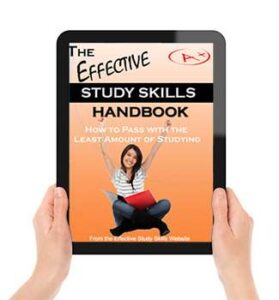
Time Management for Students
- Posted by Brian Stocker MA
- Date August 17, 2009
- Comments 16 comments
Time.
It’s a funny concept. We are always saying we don’t have time, yet we have the same amount each day. We also have the same amount as everybody else. So why is it that some people seem to have more of it than others? These same people always seem to get their tasks done and more, and rarely complain about lack of time. What do they have that you don’t? The answer is good time management. It’s not that these people live in some sci-fi world where they are magically given a few extra hours each day, they simply manage the time they have in a useful and effective way. This article will help you make better use of your time, making your learning ad recalling of information far more efficient.
Audio Version of this Post
What is Time?
To define time accurately and in detail would require a whole article in itself. To keep things simple, we can look at what we know about time. We know it is constantly passing, never stopping, and that we measure it in seconds, minutes and hours. Days, weeks, months and years are also a measurement of time. We follow time using clocks and calendars, many people keep diaries or their phone to keep track of time, and the appointments and deadlines they need to keep. This can be helpful for time management, but students may not benefit from the same strict calendar-following schedules as working adults.
Get the Complete Guide to Studying
Get Organized and Get better MarksGet the Complete Guide to Taking Notes
Learn 5 note taking stylesTaking a Test? Complete Guide to Multiple Choice
Increase your Score on any Test!Why is Time Management an Important Skill for Students?
Sure, textbooks, tutors and teachers are all incredibly useful when it comes to learning, but managing time is a major factor. Students have so much do, so much to learn, not to mention other factors such as social events, family commitments, jobs, and leisure activities. Poor time management can lead to a feeling of being overwhelmed, and when you feel overwhelmed it can be hard to get going again. What we want to do most is bury our heads in the sand and wait for the overwhelming feeling to go away. This is of no help whatsoever. In fact, it can lead to more stress and anxiety as you fall further behind. The best, and easiest, thing to do is to not let time get away from you. To not let the amount of tasks you need to do become so large you don’t know where to start. In many cases, poor time management may come across as a lack of knowledge, which can further hinder a student’s learning process – students that appear smarter often get more attention in class, therefore increasing their learning. The good news is that there are few simple ways you can get control of your time.
Tips for Developing Positive Time Management Skills
Like many other valuable skills in life, time management can be learned. You can learn and develop your skills at any stage of your life, meaning if you are a slightly disorganized student who feels like you are always overloaded with work and not enough time to complete it, you are in luck! Start by implementing some of the useful tips and you will be amazed at how much spare time you actually have!
Use ‘to-do’ lists
Rather than being ruled by dates and times, simply write a list of all the tasks you need to complete. If you have a large task, such as revising for a major exam, break it down into smaller, more specific chunks. It is very vague and overwhelming to write ‘study for anatomy test’. Instead break it into smaller sub-topic, such as each system of the human body.
If you are a forgetful person, write down everything on your ‘to-do list’, even if it’s to do the laundry! Organize your list into larger and smaller tasks and prioritize in order of importance. You may find it useful to create some kind of color code to help you (see tip 4 for more details). If you find yourself with an unexpected small amount of time, such as waiting for your dinner to cook in the oven, you can always check your list for any small tasks that can be done. This could even include packing your bag for the next day to make sure you have all your essential items. Working this way will free up more time for the larger, more time-consuming tasks.
Start with the most important tasks first
This may seem like a no-brainier, but too often people spend more time on the little, easier tasks. This is why it is important to prioritize your list. Sometimes the most important task is the most dreaded, but the only way to free yourself of its burden is to get it done! Working this way also eliminates the possibility of last minute cramming which is not only stressful, but also ineffective. Remember, your most important task might not actually take that much time – calling your mom on her birthday is a very important task!
Focus on the task at hand
Multi-tasking may seem like an easy solution to getting everything done, surely doing many things at once is a good use of your time? Don’t let that thought fool you. In fact, by trying to work on many tasks at the same time, you are unlikely to complete any, especially not to the standard they need to be. When completing your ‘to-do list’ choose a task and give it your whole attention and focus. This includes removing distractions such as the television, your phone and quite often music. By fully involving yourself in one task at a time, you are likely to get it done sooner, thus making effective use of your time.
Create organizing systems
This one is a little personalized, and many students will already have various systems in place. Develop whatever systems you can to make your life easier. Some examples include;
- Keeping your emails in check – delete emails you do not need, create folders to store important emails, allocate a set time each day to read and respond to your emails so nothing gets missed.
- Use a filing system – try using various folders or binders with dividers or a drawer with a specifically designed filing insert. Add your study notes, handouts and test papers to their allocated file. This will eliminate a pile of papers on your desk, your bag or your bedroom floor.
- Use a whiteboard or noticeboard – hang one of these in your room and write your ‘to-do list’ on it. Keep your list up to date by changing it daily, preferably in the evening so it is ready for the morning. Try using colored pens and sticky notes to help you. This system is a visual aid for all the tasks that you need to complete.
The more organized you are, the more time you can spend on the important tasks. If you know where all your notes are, your allocated one hour of study can be entirely devoted to revision, not finding your notes and study material!
Look for hidden time
Most of your tasks should be given allocated time into order to ensure that they are completed to the highest standard possible. However, some small tasks can be done on your daily bus ride, whilst waiting for the doctor or even whilst watching television. Sending quick emails to friends or family, listening to insightful podcasts (or your recorded notes), and reading your notes can all be done in this hidden time.
Sleep
Cutting out on sleep, most often by staying up late to complete assignments and to revise, may seem like one of the easiest ways to ‘add time’ to your day. Whilst this is good in theory, the reality is that a lack of sleep can decrease brain function. Any work completed when you are tired is likely to be of poor quality and information you are trying to ingest whilst studying is unlikely to stick in your memory. Aim for 7-8 hours of sleep each night in order for your body and mind to function at an optimum level. Try to keep your bedtime and wake-up time relatively the same to help create routine. When you follow many of the other tips suggested here, you will find that you won’t have the need for late night cramming as your tasks will be completed at reasonable hours of the day, with deadlines taken into consideration.
Time Management Tips
Strike a Balance: Schedule your time to participate in a number of activities such as eating, classes, studying, homework, recreation and sleeping. Be sure to find time to do something fun once in a while to break from your studies.
Arrange A Place and Time for Study: It helps to schedule a fixed time and place to study so that you form a habit of studying at the same time and place. The average study time for each week is three hours per course credit. Try to incorporate this in your daily study schedule so that it soon becomes natural to you.
Get a Schedule: prepare a study schedule that outlines when to study and do your best to stick to it. If you should miss a scheduled study time, get back to your schedule as soon as you can.
Mark Important Due Dates on the Calendar: This helps you not to be late on submitting your projects. Mark the due dates and dates you need to start working on the projects on a calendar. Always ensure you give yourself enough time to work on the project.
Study after Class: Spending a little time after class to review your notes helps ingrain what you learn into your memory as the information is still fresh. You can study at the end of classes at home or even between classes.
Do not Cram: Regular study for about one and half hours to two hours per study time helps to better understand the subject. Do not try to cram the study material. Instead study regularly to understand the material.
Use Study Groups: participating with other students in a study group is very helpful as you can gain useful insightful information and catch up with important points you may have missed.
Time Management – Conclusion
You can only gain so much learning from classes, lectures, study groups and text books. Being able to use your time effectively will ensure you get the most out of your resources. There is no ‘one size fits all’ time management system, but I have highlighted plenty of tips you can use to create your own, effective system. Be aware that it may take some time to figure out what works best for you, but you will benefit in the long run. Go out and make the most of the 24 hours you are given each day!
How to Study

… without endless hours of cramming
… without the need for tutoring
… and without sacrificing the things that matter to you!
Multiple Choice Secrets!

How to Take Notes
Learn 5 Note Taking Methods – With Full Explanation and Examples!
Taking notes is an essential academic skill and you will be doing a LOT!
Learn More and Start Practicing
Date Published: Monday, August 17th, 2009
Date Modified: Wednesday, July 17th, 2024
You may also like
Memory Palace Technique with Examples
The Memory Palace Technique creates stories with familiar places and objects which are associated with certain information. Let me explain the process, let’s us an example to help simplify. We are going to memorize the number five hundred twenty two. …
How not to Get Distracted while Studying
Just eliminate all distractions! Well, unfortunately it’s not that easy for me. I will fiddle with my pen, doodle in the textbook, get lost in thought looking out the window, or make up a song while tapping on my desk. …
Super foods for studying
Imagine taking a test and then hearing a loud “CRUNCH,” just to see the student in front of you biting into raw broccoli Or you look over and see someone eating walnuts while marking off their exam. You wonder, “What …


16 Comments
I honestly live by to-do lists. They are my saving grace. If it weren’t for to-do lists i wouldn’t get anything done. I am one of those kinds of people that has to write things down, and if it isn’t written down i will forget that it even needs to be taken care of. I think that what you say about how important it is to make sure you aren’t throwing one style of organization and time management on a student, because every student is different. You will have a handful of students that prefer calendars, another handful that prefers lists, and then a handful that doesn’t have a strategy.
As a response to the comment above, I am also taking quite a few classes, you just need to organize your time by prioritizing your work. For instance, if you have something due tomorrow, something do the next day and something due at the end of the week. Start with the thing that is due first, that way you know that it will get done on time, then move down the list.
When you are trying to prepare for a test, the best advice i can give with my experience is create a study guide for each exam, and start studying the test that will be occurring first.
Those are some tips i can give you that have worked for me in the past. Hope they help!
I was interested in the to-do lists. But I am not exactly sure how to make one. Help?
You made some good points there. I did a search on the topic and found most people will agree with your blog.
Thank for sharing information
I enjoyed checking out your blog today and I will be back to check it more in the future so please keep up your good quality work. I love the colors that you chose, you are quite talented!
thank you i have got many points under the title”time management for students”. Once again thank you
Great post,
you are a great help.
Would you be interested by exchanging hyperlinks?
Of course – the site would have to be on interest to our visitors.
Thank you, keep up the good work:)
Couldn’t have said it better myself.
hey guys thks for the tips
Hi, plz give me time managament. Iam the student of ca-ipcc from direct entry scheme. Now I m also in articleship training
Great article, tips are quite helpful to time management for students. Good stuff
Time management is not easy to master, but it is necessary to be successful in studies and work. And I think that prioritizing is the most necessary skill.
Thank you for your advice! I can also add some good articles with practical tips on time management and learning strategies from this list: https://www.csusm.edu/asc/studentresources/onlinetools.html That would be a good addition to your information.